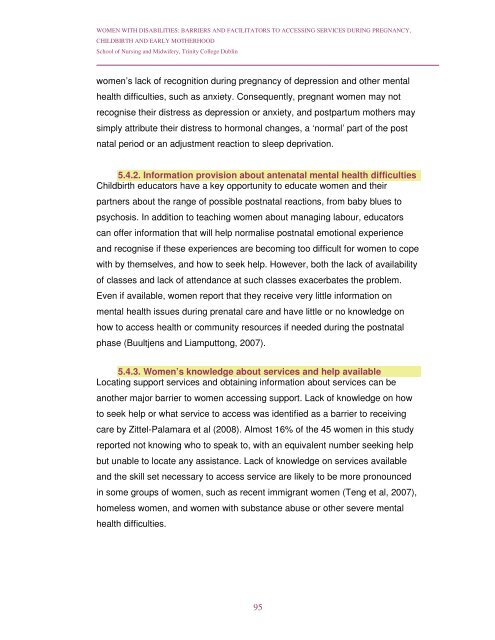Women with Disabilities: Barriers and Facilitators to Accessing ...
Women with Disabilities: Barriers and Facilitators to Accessing ...
Women with Disabilities: Barriers and Facilitators to Accessing ...
Create successful ePaper yourself
Turn your PDF publications into a flip-book with our unique Google optimized e-Paper software.
WOMEN WITH DISABILITIES: BARRIERS AND FACILITATORS TO ACCESSING SERVICES DURING PREGNANCY,CHILDBIRTH AND EARLY MOTHERHOODSchool of Nursing <strong>and</strong> Midwifery, Trinity College Dublinwomen’s lack of recognition during pregnancy of depression <strong>and</strong> other mentalhealth difficulties, such as anxiety. Consequently, pregnant women may notrecognise their distress as depression or anxiety, <strong>and</strong> postpartum mothers maysimply attribute their distress <strong>to</strong> hormonal changes, a ‘normal’ part of the postnatal period or an adjustment reaction <strong>to</strong> sleep deprivation.5.4.2. Information provision about antenatal mental health difficultiesChildbirth educa<strong>to</strong>rs have a key opportunity <strong>to</strong> educate women <strong>and</strong> theirpartners about the range of possible postnatal reactions, from baby blues <strong>to</strong>psychosis. In addition <strong>to</strong> teaching women about managing labour, educa<strong>to</strong>rscan offer information that will help normalise postnatal emotional experience<strong>and</strong> recognise if these experiences are becoming <strong>to</strong>o difficult for women <strong>to</strong> cope<strong>with</strong> by themselves, <strong>and</strong> how <strong>to</strong> seek help. However, both the lack of availabilityof classes <strong>and</strong> lack of attendance at such classes exacerbates the problem.Even if available, women report that they receive very little information onmental health issues during prenatal care <strong>and</strong> have little or no knowledge onhow <strong>to</strong> access health or community resources if needed during the postnatalphase (Buultjens <strong>and</strong> Liamput<strong>to</strong>ng, 2007).5.4.3. <strong>Women</strong>’s knowledge about services <strong>and</strong> help availableLocating support services <strong>and</strong> obtaining information about services can beanother major barrier <strong>to</strong> women accessing support. Lack of knowledge on how<strong>to</strong> seek help or what service <strong>to</strong> access was identified as a barrier <strong>to</strong> receivingcare by Zittel-Palamara et al (2008). Almost 16% of the 45 women in this studyreported not knowing who <strong>to</strong> speak <strong>to</strong>, <strong>with</strong> an equivalent number seeking helpbut unable <strong>to</strong> locate any assistance. Lack of knowledge on services available<strong>and</strong> the skill set necessary <strong>to</strong> access service are likely <strong>to</strong> be more pronouncedin some groups of women, such as recent immigrant women (Teng et al, 2007),homeless women, <strong>and</strong> women <strong>with</strong> substance abuse or other severe mentalhealth difficulties.95
















